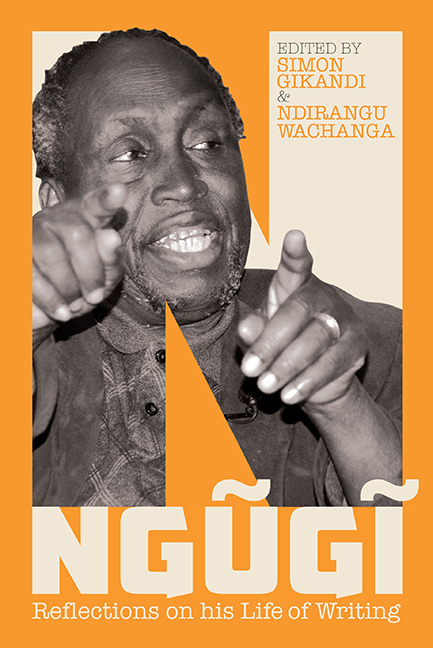Book contents
- Frontmatter
- Contents
- Preface
- Acknowledgements
- Chronology
- Photographic Section
- Introduction: Ngũgĩ wa Thiong'o: Reflections on His Life of Writing
- Ngũgĩ at Work
- Part I Serenades & Beginnings
- Part II Memories, Recollections & Tributes
- 10 Remembering Early Conversations with Ngũgĩ
- 11 Ngũgĩ wa Thiong'o at 80: Pongezi (Congratulations!)
- 12 Ngũgĩ wa Thiong'o at 80: Inspiring Encounters
- 13 Ngũgĩ in the 1970s at the University of Nairobi
- 14 ‘Professor, You are in Ngũgĩ's Book’
- 15 Mũraata, Mũrutani, na Mũthikĩrĩria (Friend, Teacher & Listener)
- 16 Fear & Trepidation in Asmara: Meeting Ngũgĩ
- 17 Ngũgĩ wa Thiong'o: A True Story
- 18 Ngũgĩ wa Thiong'o: Tribute on His 80th Birthday
- Part III Working with Ngũgĩ
- Part IV The Writer, the Critic & the World
- Part V The Other Ngũgĩ
- Appendixes
- References
- Bibliography of Ngũgĩ's Primary Works
- Works Cited
- Notes on Contributors
- Index
11 - Ngũgĩ wa Thiong'o at 80: Pongezi (Congratulations!)
from Part II - Memories, Recollections & Tributes
Published online by Cambridge University Press: 27 July 2019
- Frontmatter
- Contents
- Preface
- Acknowledgements
- Chronology
- Photographic Section
- Introduction: Ngũgĩ wa Thiong'o: Reflections on His Life of Writing
- Ngũgĩ at Work
- Part I Serenades & Beginnings
- Part II Memories, Recollections & Tributes
- 10 Remembering Early Conversations with Ngũgĩ
- 11 Ngũgĩ wa Thiong'o at 80: Pongezi (Congratulations!)
- 12 Ngũgĩ wa Thiong'o at 80: Inspiring Encounters
- 13 Ngũgĩ in the 1970s at the University of Nairobi
- 14 ‘Professor, You are in Ngũgĩ's Book’
- 15 Mũraata, Mũrutani, na Mũthikĩrĩria (Friend, Teacher & Listener)
- 16 Fear & Trepidation in Asmara: Meeting Ngũgĩ
- 17 Ngũgĩ wa Thiong'o: A True Story
- 18 Ngũgĩ wa Thiong'o: Tribute on His 80th Birthday
- Part III Working with Ngũgĩ
- Part IV The Writer, the Critic & the World
- Part V The Other Ngũgĩ
- Appendixes
- References
- Bibliography of Ngũgĩ's Primary Works
- Works Cited
- Notes on Contributors
- Index
Summary
Looking back over a period of five decades, I believe that my decision to resume school as a mature age student was a turning point, with Ngũgĩ wa Thiong'o unknowingly playing a critical role in my studies and future orientation. Although I had studied English Literature at secondary school and at Makerere College, I was oblivious of the fact that Africa had a body of literature worth studying. I proceeded to teach English Literature at secondary school level for nearly four years before going to Leeds University to study for a certificate in ‘The Teaching of English as a Second Language’ for a year. By coincidence, the topic I picked for my main paper at Leeds was entitled ‘The Teaching of English Literature in Kenyan Secondary Schools’.
Although I recorded the challenges of culture and background in understanding such literature, it never occurred to me that there was any other alternative. My training as a teacher at Makerere had taught me that in the teaching of any subject, you started from the known to the unknown as a mandatory cognitive principle. How then was I supposed to relate Jane Austen's Emma to the ‘known’ in my introduction? How were my students and I expected to relate to the ‘drawing room’ in the novel? For us the drawing room was the room where Emma retreated whenever she wanted to draw!
Mercifully, my entry into the first-year degree program at the University of Nairobi coincided with the great debate generated by the trio—Ngũgĩ wa Thiong'o (James Ngũgĩ at the time), Owuor Anyumba, and Taban lo Liyong. In a 1968 paper entitled ‘On the abolition of the English Department’, they sought to adopt the ‘Literature Department’ as the preferred title of the program, and went further to employ the cognitive principle of beginning from the known to the unknown. But their proposal was not simply a title change; they were calling for the total overhaul of the curriculum of the then English Department.
The proposed curriculum recognized the importance of African Literature as a critical, central core of the study of literature in Africa. East African Literature was to become the most logical introduction to African Literature in English.
- Type
- Chapter
- Information
- NgugiReflections on his Life of Writing, pp. 66 - 68Publisher: Boydell & BrewerPrint publication year: 2018

